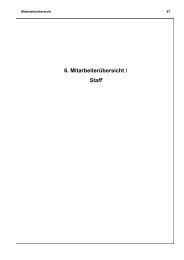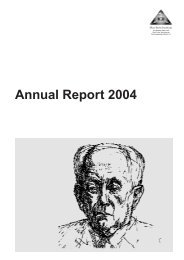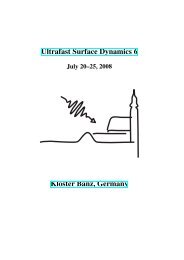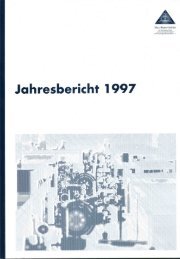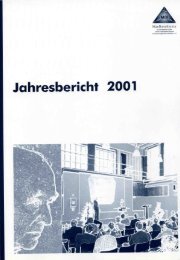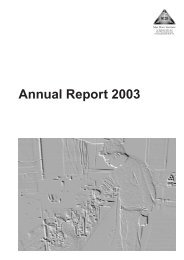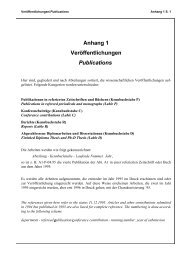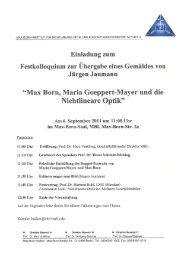You also want an ePaper? Increase the reach of your titles
YUMPU automatically turns print PDFs into web optimized ePapers that Google loves.
Pandora’s box<br />
myself<br />
I regarded as my own. I would have difficulty in adapting to the modern way of doing science<br />
with teams of specialists. The philosophical background of science has always interested me<br />
more than its special results.”<br />
<strong>Max</strong> <strong>Born</strong> was also a role model with respect to yet another important aspect – a scientist’s<br />
responsibility to society. As a witness and also as a party involved in the – in the strictest sense<br />
of the word – enormous development of the sciences and technology he warned against the<br />
consequences. Particularly after his return from Edinburgh in 1953, in his lectures and writings<br />
<strong>Born</strong> took a stance against nuclear armament, which seemed almost inevitable at the height<br />
of the Cold War. <strong>Born</strong> is one of the most prominent authors of the Göttingen Manifesto of 12<br />
April 1957 published by 18 German nuclear scientists protesting against acquiring atomic<br />
weapons for the German Armed Forces.<br />
In his memoirs, <strong>Max</strong> <strong>Born</strong> concludes with a chapter that urges us all to think about our lives,<br />
and from which I take the following quotation: “I am haunted by the idea that this break in<br />
human civilization, caused by the discovery of the scientific method, may be irreparable. Although<br />
I love science I have the feeling that it is so completely opposed to historical development<br />
and tradition that it cannot be absorbed by our civilization. The political and military terror<br />
and the complete collapse of ethics which I witnessed in my life are not symptoms of a<br />
temporary social weakness but are rather the inevitable consequence of the rise of science –<br />
which in itself is one of the greatest intellectual achievements of mankind.”<br />
These words are of great relevance today. It is important that we are aware what a minor role<br />
the nuclear threat plays in public opinion today – even after the threats by North Korea and<br />
Iran. After the end of the Cold War, the threats have shifted. Our attention is not focused so<br />
much on the possibility of the nuclear danger but on the reality of the cynicism of religiously<br />
motivated terrorists. Ultimately, however, the basis for this possible terror has not been reduced,<br />
but has, on the contrary, expanded. Today no one can definitively rule out the possibility<br />
of the fanatics of this world acquiring nuclear weapons and making use of them in a mad orgy<br />
of destruction.<br />
And <strong>Born</strong> only referred to physical research and its fall, in the Biblical sense, expressed in the<br />
famous statement by <strong>Born</strong>’s student Oppenheimer with reference to the uranium and plutonium<br />
bombs dropped on Hiroshima and Nagasaki. Physics was the leading science of <strong>Max</strong> <strong>Born</strong>’s<br />
twentieth century. Much points to biology becoming the leading science of the twenty-first century.<br />
Once again, mankind feels called upon to imitate Prometheus. But we should remember<br />
that after Prometheus the gods sent us Pandora’s box. I believe that hardly anyone today<br />
would assume or even recognize the smallest sign that the process of learning which <strong>Max</strong> <strong>Born</strong>,<br />
<strong>Max</strong> <strong>Born</strong> • Paul Corkum 51




